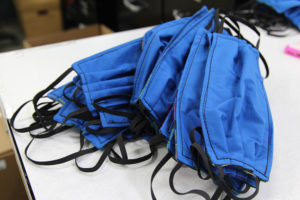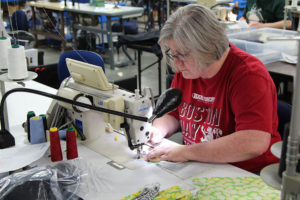Though marching activities have been canceled through the summer season, organizations and businesses have found ways to stay engaged.
The COVID-19 pandemic has redefined normal for everyone in the world. As COVID-19 spread across the globe, stadiums that should’ve been packed with athletes and musicians stood empty. Countless performers in the marching arts, along with their directors and organizations, had to find alternate ways to unite and share their passion.
From WGI Sport of the Art’s online “[ i ] AM WGI Day” to uniform manufacturers making masks, COVID-19 made marchers take a detour, but it hasn’t stopped the groups from marching forward.
The Effect of Cancellations
Starting March 11, when the World Health Organization (WHO) officially characterized COVID-19 as a pandemic, the cancellations began pouring in. That day, WGI, whose season was in progress and approaching its pinnacle, canceled all remaining events, including its world championships.
On March 12, the NCAA canceled March Madness basketball tournaments, affecting the many marching groups slated to perform.
On March 13, the Tournament of Bands (TOB) canceled the rest of its Tournament Indoor Association (TIA) events and its Atlantic Coast Championships.
On March 25, Drum Corps International (DCI) canceled its entire season. Then, on March 29, Drum Corps Associates (DCA) canceled as well.
In the interim, colleges and universities sent students home, shifting to online learning for the rest of the academic year. For Villanova University’s marching band, March Madness’s cancellation hit particularly hard and suddenly.
Director of Bands Beth Sokolowski recalls how March 12 fell during Villanova’s first week back from spring break. Band members woke up early and met in the band room, where a bus was waiting to take them to Madison Square Garden to play for the Big East tournament. About 30 minutes before they were supposed to leave, they received word that the tournament had been canceled.
WGI, DCI, and DCA all had their fingers on the pulse of the news as March unfolded. In fact, WGI knew about the risk relatively early on. WGI had been scheduled to have an event in China in May 2020, and Ron Nankervis, WGI chief executive officer, had arranged a planning visit for the end of January but canceled his trip. “We saw this coming,” Nankervis says.
Still, WGI contacted local health officials to learn as much as possible before making a decision that would affect so many. “The [WGI] board of directors [wanted] to do the right thing and protect the health and safety of our participants as well as the 40,000 fans that come to our event in April,” Nankervis says.
DCI’s board of directors, staff, and member organizations thought along the same lines. The decision seemed destined as the news unfolded, recounts Dan Acheson, DCI chief executive officer. “Once performers’ safety was put on the table, nothing else really mattered,” he says.
The decision affects dozens of groups, including 2019 DCI World Champions, The Blue Devils Drum and Bugle Corps. The decision was “one that we didn’t want to make but one we felt we had to make,” says Shaun Gallant, chief executive director of BD Performing Arts.
DCA president Allen Buell acknowledges the ripple effect of the cancellations. “I have a heart, and it breaks my heart to read how many people that we have affected,” he says.
 For example, the Hawthorne Caballeros Drum and Bugle Corps had been rehearsing since Thanksgiving weekend and continued working right up until March 29 when DCA’s cancellation became official. By that time, however, the corps had switched to conference call rehearsals. Despite continuing to work, the Caballeros worked with the other DCA corps in deciding to cancel. “It was a collaborative effort,” says Alan Katz, Caballeros business manager.
For example, the Hawthorne Caballeros Drum and Bugle Corps had been rehearsing since Thanksgiving weekend and continued working right up until March 29 when DCA’s cancellation became official. By that time, however, the corps had switched to conference call rehearsals. Despite continuing to work, the Caballeros worked with the other DCA corps in deciding to cancel. “It was a collaborative effort,” says Alan Katz, Caballeros business manager.
The Helpers
While many schools and drum corps were shutting down, some manufacturers involved in the marching arts kept on working. Stanbury Uniforms, located in the small town of Brookfield, Missouri, had zero confirmed cases in its county in March. Still, in February, Stanbury could see the potential severity and began looking at ways to help local healthcare workers. “At that point we didn’t know, honestly, how long our area would be spared,” says Jeff Elliott, marketing and media specialist for Stanbury Uniforms.
 Therefore, Stanbury got to work making washable and reusable cloth masks. Though not rated for full medical use, the masks have three layers of fabric, allowing fewer outside molecules to get through.
Therefore, Stanbury got to work making washable and reusable cloth masks. Though not rated for full medical use, the masks have three layers of fabric, allowing fewer outside molecules to get through.
When schools started closing nationwide, G2 Performance, which also manufactures marching apparel, looked at ways to keep workers employed. The Delaware Manufacturing Extension Partnership (DEMEP) reached out to G2, offering an open source document containing many methods for sewing personal protective equipment. Based in Newport, Delaware, “[G2 has] a very good working relationship with [DEMEP] already,” says Vaughan Sawdon, founder and chief executive officer of G2.
G2 chose to make two-layer fabric masks with an inside pocket for a filter. The masks are going to community members, with some being given away and delivered to people’s houses and others being sold online. G2 also acquired KN95 masks through its supply channels. Those masks are being distributed to local adult care facilities and being sold online.
 At Band Shoppe, president Jay Pearison credits his employees for coming up with the idea to make masks. “I can’t express how proud we are of our staff for getting the process going,” he says.
At Band Shoppe, president Jay Pearison credits his employees for coming up with the idea to make masks. “I can’t express how proud we are of our staff for getting the process going,” he says.
Band Shoppe’s materials, including a specific type of cotton and flannel, come from a supplier that meets guidelines from the Centers for Disease Control and Prevention and are sewn in a pattern from The Turban Project.
“There are people who are dying, there are people who are really sick, and we can sew, so that’s what we’re gonna do,” Pearison says.
Based in Cynthiana, Indiana, the company is sending masks to a variety of locations, including hospitals, Chemo Buddies, nursing homes, sheriff’s departments, and local doctors’ offices.
Showing just how rapidly COVID-19 transformed lives day by day, on April 1—one day after being interviewed for this story—a healthcare worker in Stanbury’s county tested positive for the virus. As a result, the county government announced a stay-at-home order that went into effect the morning of April 3, forcing Stanbury to halt mask production. At the time of the interview, Stanbury was making up to 2,000 masks per day.
The support hasn’t stopped at masks. D’Addario’s engineering team devised a way to create face shields for healthcare workers using the same clear film from its Evans G2 drumheads. The company plans to ramp up production to make 100,000 shields per week. “We called this Project Excelsior after the New York State motto, which means ‘Ever Upward,’ because it captured the extraordinary determination and can-do spirit of our small team of engineers and product designers,” said John D’Addario III, chief executive officer of the company in Farmingdale, New York, in a press release. “It also typifies our music company’s current credo during the COVID-19 crisis: #wewillplayon.”
Virtual Engagement
With everyone dispersing or canceling long-held plans so abruptly, organizations have acted quickly to shift to virtual engagement opportunities.
For Sokolowski, “the most endearing and sweetest moment” as Villanova disbanded for the year came via spontaneous engagement. On March 15, the cutoff for students to vacate the campus, about 75% of the marching seniors gathered together and played the fight song one last time before leaving. They also filmed the performance and texted it to her.
 TIA announced its scholarship winners online and shared webinars from various partners. DCI launched the #MarchOn fundraising campaign in direct response to COVID-19. The campaign allows people to donate money to DCI and DCI’s member corps.
TIA announced its scholarship winners online and shared webinars from various partners. DCI launched the #MarchOn fundraising campaign in direct response to COVID-19. The campaign allows people to donate money to DCI and DCI’s member corps.
 WGI took its tagline for the 2020 season, “I AM WGI” and transformed it into an entire virtual event, “[ i ] AM WGI Day” on April 4, what would have been the day for its winter guard championships. The free event included raffles and giveaways, a virtual expo tent showcasing the 2020 sponsors, partners, and vendors, and even a virtual jumbotron that showcased social media posts with the hashtag, “#iamwgi.”
WGI took its tagline for the 2020 season, “I AM WGI” and transformed it into an entire virtual event, “[ i ] AM WGI Day” on April 4, what would have been the day for its winter guard championships. The free event included raffles and giveaways, a virtual expo tent showcasing the 2020 sponsors, partners, and vendors, and even a virtual jumbotron that showcased social media posts with the hashtag, “#iamwgi.”
Toward the Future
Even as the world reopens, the effects of COVID-19 will reverberate for some time. Large gatherings that are needed for full rehearsals, not to mention performances with a live audience, might continue to be on hold. Schools, corps, and other large youth organizations are looking to next season.
The Michigan State University Spartan Marching Band is hoping and planning for a “somewhat normal return” in August, says David Thornton, director. “Certainly none of this is ideal,” he says. “We’re just trying to make the best of it and make it as normal as possible. Our students … are very passionate about having everything be the greatest possible next year.”
One of the first decisions DCI made after canceling its season was in support of its performers: Anyone who would have aged out of DCI after the 2020 season will be welcomed back in 2021.
According to Gallant, “If you’re a Blue Devil for 2020, … you’re a Blue Devil for 2021.”
WGI is in a unique position. Its board of directors has continually set aside money into an emergency fund, starting long ago. “We can absorb this hit because of the plans that we enacted almost two decades ago,” Nankervis says.
Buell is both realistic and optimistic. “I wouldn’t be real if I didn’t say not [every marching organization] will survive,” he says.
However, he believes the bottled-up enthusiasm left over from this season will benefit DCA and other marching organizations. “It’s going to boom next year,” Buell says. “The music goes on. Nothing has ever stopped.”


